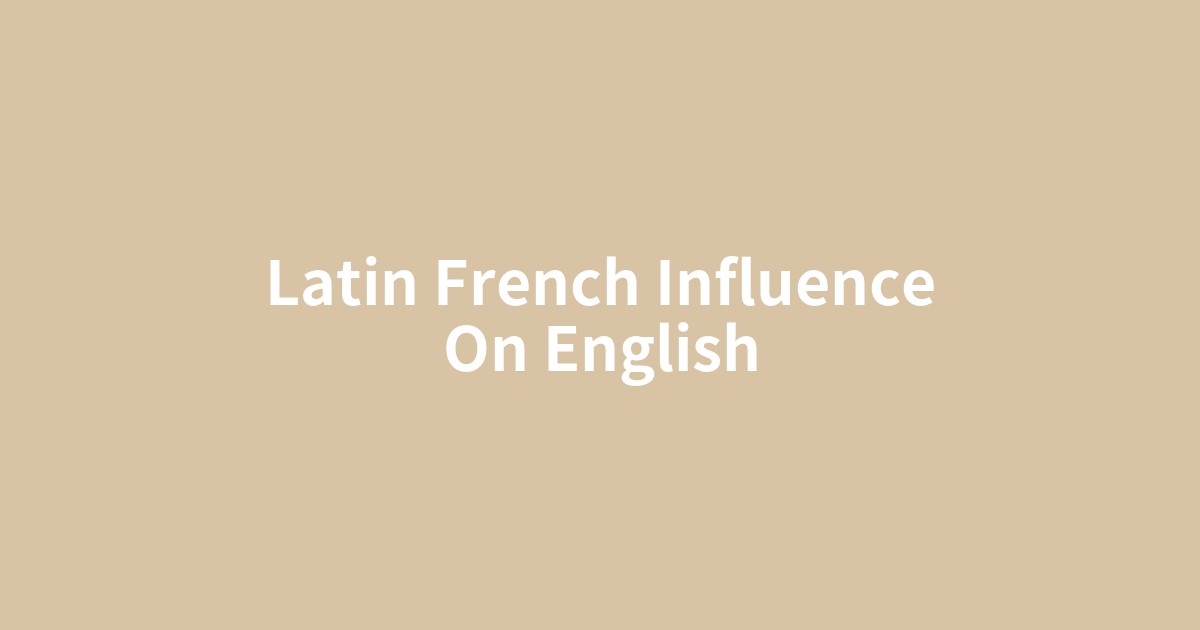このページは、歴史や文化の物語を楽しみながら、その文脈の中で重要な英単語を自然に学ぶための学習コンテンツです。各セクションの下にあるボタンで、いつでも日本語と英語を切り替えることができます。背景知識を日本語で学んだ後、英語の本文を読むことで、より深い理解と語彙力の向上を目指します。

英語の語彙が、なぜこれほど豊かで複雑なのか。ローマ帝国とノルマン・コンクエストという二度の大きな歴史的出来事が、英語に与えた絶大なinfluence(影響)。
この記事で抑えるべきポイント
- ✓現代英語の語彙の約7割は、ゲルマン語系の古英語ではなく、ラテン語やフランス語に由来するという見方があること。
- ✓この言語的変化の背景には、古代ローマによるブリタニア支配と、1066年のノルマン・コンクエストという二つの大きな歴史的転換点が存在すること。
- ✓ノルマン・コンクエスト後、支配階級がフランス語を、学問や宗教の世界ではラテン語が使われたため、ゲルマン系の古英語由来の言葉と、ラテン・フランス語由来の言葉との間に階層性が生まれたとされていること。
- ✓この歴史的経緯から、英語には同じ意味でもゲルマン語由来の日常的な単語(例:cow)と、ラテン・フランス語由来のフォーマルな単語(例:beef)が併存する「二重語彙構造」が形成されたこと。
英単語の7割はラテン語・フランス語由来?
「尋ねる」を意味する英語に、なぜ『ask』と『inquire』のように、似た意味を持つ単語が複数存在するのでしょうか。この素朴な疑問は、英語という言語が持つ、奥深い歴史の扉を開く鍵となります。実は、現代英語の「語彙(vocabulary)」の約7割は、ゲルマン語系の古英語ではなく、「ラテン語(Latin)」や「フランス語(French)」に由来するという説があるのです。この記事では、その背景にある古代ローマとノルマン・コンクエストという二つの歴史的転換点を辿り、英語の豊かさと複雑さの謎を解き明かしていきます。
Are 70% of English Words Derived from Latin and French?
Why does the English language have multiple words with similar meanings, such as 'ask' and 'inquire' for “to question”? This simple question is the key to unlocking the profound history of the English language. In fact, there is a theory that about 70% of the modern English vocabulary is derived not from Germanic Old English, but from Latin and French. In this article, we will delve into the two major historical turning points behind this—Ancient Rome and the Norman Conquest—to unravel the mystery of the richness and complexity of English.
英語の源流:ゲルマンの森から生まれた古英語
現代英語の「土台」を築いたのは、5世紀頃に現在のデンマークやドイツ北部からブリテン島に移住した、アングロ・サクソン人がもたらしたゲルマン語系の一言語でした。これが「古英語(Old English)」として知られています。私たちが日常的に使う基礎的な単語の多く、例えば man(人)、house(家)、eat(食べる)、drink(飲む)といった言葉は、このゲルマン系の言語にそのルーツを持っています。これらは、日々の生活に密着した、素朴で力強い言葉たちでした。
The Source of English: Old English Born from Germanic Forests
The foundation of modern English was laid by a Germanic language brought to the British Isles around the 5th century by the Anglo-Saxons, who migrated from present-day Denmark and northern Germany. This is known as Old English. Many of the basic words we use daily, such as man, house, eat, and drink, have their roots in this Germanic language. These were simple, powerful words closely tied to everyday life.
第一の波:ローマ帝国が残したラテン語の遺産
英語の歴史における最初の大きな転換点は、古代ローマによるブリタニア支配でした。紀元43年から約400年間にわたる統治と、その後のキリスト教の伝来は、英語に「ラテン語(Latin)」の語彙をもたらす最初の波となります。特に、宗教、学問、法律といった知的・権威的な分野で、その「影響(influence)」は顕著でした。priest(司祭)、school(学校)、master(主人)といった言葉が英語に根付き始めたのです。この言語的接触は、ゲルマンの森で生まれた言葉に、地中海の文明の光を当てる最初の出来事でした。
The First Wave: The Legacy of Latin Left by the Roman Empire
The first major turning point in the history of English was the Roman rule of Britannia. The governance from 43 AD for about 400 years and the subsequent spread of Christianity became the first wave that brought Latin vocabulary into English. The influence was particularly notable in intellectual and authoritative fields such as religion, academia, and law. Words like priest, school, and master began to take root in English. This linguistic contact was the first event to cast the light of Mediterranean civilization on the words born in the Germanic forests.
決定的な転換点:1066年 ノルマン・コンクエスト
英語の運命を決定的に変えたのが、1066年に起きた「ノルマン・コンクエスト」です。フランスのノルマンディー公ウィリアムがイングランドを征服し、新たな支配階級となりました。この軍事的な「侵略(invasion)」は、イングランドの社会構造だけでなく、言語にも劇的な変化をもたらします。宮廷、政府、議会、法廷では、支配者の言葉である「フランス語(French)」が公用語となったのです。その結果、government(政府)、justice(正義)、parliament(議会)、victory(勝利)といった、統治や法律、軍事に関する大量のフランス語語彙が英語に流入しました。また、食文化においても、上流階級の洗練された言葉が持ち込まれました。
The Decisive Turning Point: The Norman Conquest of 1066
What decisively changed the fate of English was the Norman Conquest of 1066. William, Duke of Normandy in France, conquered England and became the new ruling class. This military invasion brought dramatic changes not only to England's social structure but also to its language. In the court, government, parliament, and courts of law, the rulers' language, French, became the official language. As a result, a vast amount of French vocabulary related to governance, law, and the military, such as government, justice, parliament, and victory, flowed into English. Furthermore, sophisticated words from the upper class were also introduced into the culinary world.
二重語彙構造の誕生:なぜ「cow」と「beef」は別なのか?
ノルマン・コンクエストがもたらした最も興味深い現象の一つが、「二重語彙構造」の誕生です。これは、同じものを指し示しながらも、由来の異なる二つの単語が併存する状態を指します。その典型例が、食肉に関する言葉です。被支配階級となったアングロ・サクソン人の農民たちは、ゲルマン系の古英語を話し続け、家畜を育てました。彼らが育てるのは cow(牛)、pig(豚)、sheep(羊)です。一方、支配階級のノルマン貴族たちは、食卓に並んだその肉をフランス語由来の言葉で呼びました。それが beef(牛肉)、pork(豚肉)、mutton(羊肉)です。つまり、労働の現場の言葉と、食卓の上の高尚な言葉が区別されたのです。この階層性は、日常的な単語とフォーマルな単語の使い分けとして、現代英語にもその名残を留めています。
The Birth of a Lexical Doublet: Why are 'cow' and 'beef' different?
One of the most interesting phenomena brought about by the Norman Conquest is the birth of the 'lexical doublet.' This refers to the coexistence of two words with different origins that point to the same thing. A classic example is words related to meat. The subjugated Anglo-Saxon peasants continued to speak Germanic Old English and raised livestock. They raised cow, pig, and sheep. On the other hand, the ruling Norman nobles called the meat on their dining tables by words derived from French. These were beef, pork, and mutton. In other words, a distinction was made between the language of the workplace and the sophisticated language of the dining table. This hierarchy remains in modern English as the distinction between everyday words and formal words.
結論:歴史が織りなす言葉のタペストリー
英語の「語彙(vocabulary)」の豊かさは、単なる偶然の産物ではありません。それは、古代ローマの置き土産と、ノルマン・コンクエストという壮大な歴史のうねりがもたらした、偉大な文化的遺産なのです。一つひとつの単語の語源(etymology)を辿る旅は、ヨーロッパ史のダイナミズムを肌で感じる知的冒険と言えるでしょう。この歴史的背景を知ることは、無味乾燥に見えがちな単語暗記に彩りを与え、あなたの英語学習に新たな深みと楽しみをもたらす鍵となるに違いありません。
Conclusion: A Tapestry of Words Woven by History
The richness of the English vocabulary is not a mere product of chance. It is a great cultural heritage brought about by the legacy of Ancient Rome and the grand historical swell of the Norman Conquest. The journey of tracing the etymology of each word can be described as an intellectual adventure that allows you to feel the dynamism of European history firsthand. Knowing this historical background will add color to what might seem like tedious vocabulary memorization and will undoubtedly bring new depth and enjoyment to your English learning.
テーマを理解する重要単語
vocabulary
「語彙」を意味し、この記事全体のテーマそのものです。現代英語の語彙の約7割がラテン語・フランス語由来であるという説を軸に、その背景が語られます。この単語の意味を捉えることで、記事が解き明かそうとしている英語の構造的な豊かさへの理解が深まります。
文脈での用例:
Reading books is one of the best ways to expand your vocabulary.
本を読むことは、語彙を増やすための最良の方法の一つです。
inquire
ラテン語由来で「尋ねる」を意味するフォーマルな単語です。記事冒頭でゲルマン語系の'ask'と対比されることで、英語が持つ語彙の階層性を象徴しています。この単語は、英語の歴史的背景が現代の単語の使い分けにどう影響しているかを理解する上で、最初の鍵となります。
文脈での用例:
Several customers called to inquire about our new service.
何人かの顧客が、私たちの新しいサービスについて問い合わせるために電話をしてきました。
derive
「〜に由来する」という意味で、語源を語る本記事で繰り返し使われる最重要動詞です。'be derived from ~'の形で、ある単語がどの言語から来たのかを説明します。この表現を理解することが、英語の語彙が持つ歴史的な重層性を読み解くための前提となります。
文脈での用例:
Many English words are derived from Latin.
多くの英単語はラテン語に由来している。
influence
「影響」を意味し、この記事では特に古代ローマが英語に与えたラテン語の語彙という「第一の波」を説明する上で中心的な役割を果たします。歴史的出来事が言語にどう作用したかを理解する鍵であり、文化的な接触がもたらす変化の大きさを実感できる単語です。
文脈での用例:
His parents still have a great deal of influence over his decisions.
彼の両親は今でも彼の決断に対して大きな影響力を持っている。
hierarchy
「階層制」を意味し、cow(ゲルマン系)とbeef(フランス語系)の語彙の使い分けが生まれた社会背景を説明する上で不可欠な概念です。言語が単なる伝達手段ではなく、社会の階層構造を反映する鏡であることを示しており、この記事の最も興味深い論点を理解する鍵となります。
文脈での用例:
The myth of Purusha justified a rigid social hierarchy with the priests at the top.
プルシャの神話は、司祭を頂点とする厳格な社会階層制を正当化しました。
invasion
「侵略」を意味し、ノルマン・コンクエストの軍事的な側面を強調する言葉です。この「軍事的な侵略」が、イングランドの支配階級を入れ替え、彼らの言語であるフランス語を公用語に押し上げた、という劇的な変化の引き金として描かれています。conquestの背景を補強する単語です。
文脈での用例:
The threat of invasion from the neighboring country was a constant concern.
隣国からの侵攻の脅威は、絶え間ない懸念事項でした。
tedious
「退屈な、うんざりする」という意味の形容詞です。「無味乾燥に見えがちな(tedious)単語暗記」という表現で、多くの英語学習者が抱える悩みに寄り添っています。歴史的背景を知ることが、この退屈さを乗り越え、学習に深みと楽しみをもたらすという記事の主張を際立たせる効果があります。
文脈での用例:
He found the task of sorting files to be extremely tedious.
彼はファイルを分類する作業が極めて退屈だと感じた。
conquest
「征服」を意味し、特に「ノルマン・コンクエスト」という英語史の決定的な転換点を指す固有名詞として登場します。単なる軍事侵攻(invasion)だけでなく、その後の統治と社会構造の変化までを含むニュアンスがあり、言語に大変革をもたらした歴史的事件の重みが伝わります。
文脈での用例:
The Norman conquest of England occurred in 1066.
イングランドのノルマン征服は1066年に起こった。
subjugate
「征服し、従属させる」という強い意味を持つ動詞です。記事では「被支配階級となった(subjugated)アングロ・サクソン人」という形で登場します。この単語は、ノルマン・コンクエスト後のイングランドの民衆の立場を明確にし、言語の階層性が生まれた歴史的力学を理解させます。
文脈での用例:
The empire subjugated many smaller kingdoms over the centuries.
その帝国は何世紀にもわたって多くの小王国を服従させた。
coexist
「共存する」を意味し、ゲルマン語系の単語とフランス語系の単語が現代英語の中に併存する「二重語彙構造」という現象を的確に説明する動詞です。歴史の過程で生まれた二つの源流が、どのようにして一つの言語の中に溶け込んでいるのか、その状態を理解するのに役立ちます。
文脈での用例:
It is difficult for different cultures to coexist peacefully in the same region.
異なる文化が同じ地域で平和的に共存するのは難しい。
etymology
「語源学」を意味し、この記事が提供する知的冒険そのものを指す単語です。単語の歴史的ルーツを辿ることが、ヨーロッパ史のダイナミズムを体感する旅であると述べられています。この言葉は、本記事のテーマと学習アプローチを象徴しており、知的好奇心を刺激する鍵となります。
文脈での用例:
The etymology of 'hospital' reveals its original meaning of 'hospitality'.
「hospital」の語源は、その元々の意味である「もてなし」を明らかにします。
tapestry
「タペストリー(綴れ織り)」を意味し、結論部分で、様々な言語的要素が織りなす英語の豊かさと複雑さを表現する美しい比喩として使われています。この単語を知ることで、歴史が作り上げた英語の奥深さという、筆者の伝えたい核心的なイメージを鮮やかに感じ取ることができます。
文脈での用例:
The novel presents a rich tapestry of characters and events.
その小説は、登場人物や出来事が織りなす豊かなタペストリーを提示しています。